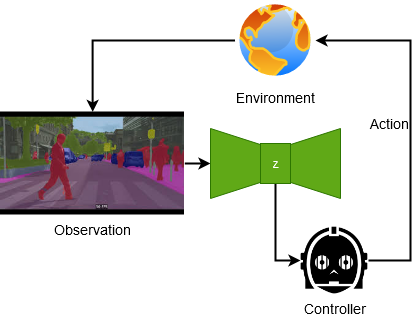Seminar: Robot Learning
Prof. Dr. Abhinav Valada
Co-Organizers:
Markus Käppeler Niclas Vödisch Eugenio Chisari Nick Heppert
Deep learning has become a key enabler of real world autonomous systems. Due to the significant advancement in deep learning, these systems are able to learn various tasks end-to-end, including for perception, state estimation, and control, thereby making important progress in object manipulation, scene understanding, visual recognition, object tracking, and learning-based control, amongst others. In this seminar, we will study a selection of state-of-the-art works that propose deep learning techniques for tackling various challenges in autonomous systems. In particular, we will analyze contributions in architecture design, and techniques selection that also include computer vision, reinforcement learning, imitation learning, and self-supervised learning.

Course Information
|
Details:
|
Course Number: 11LE13S-7317-M
Places: 12
Room 00.021, building 080
|
|
Course Program:
|
Introduction: 18/10/2024 @ 13:00
How to make a presentation: Postponed to 17/01/2025 @ 13:00
Block Seminar: 07/02/2025 @ 09:00
|
|
Evaluation Program:
|
Seminar Presentation: 07/02/2025 @ 09:00
Summary Due Date: 21/02/2025 @ 23:59
|
|
Requirements:
|
Basic knowledge of Deep Learning or Reinforcement Learning
|
|
Remarks:
|
Topics will be assigned for the seminar via a preference voting. If there are more
interested students than places, places will be assigned based on priority
suggestions
of the HisInOne system and motivation. The date of registration is irrelevant. In particular, we
want to avoid that students grab a topic and then leave the seminar. Please have a coarse
look at all available papers to make an informed decision before you commit.
|
Course Material
|
Slides:
|
Lecture 1: Introduction
Lecture 2: How to Make a Good Presentation
|
|
Templates:
|
Additional Information
Enrollment Procedure
- Enroll through HISinOne, the course number is 11LE13S-7317-M.
- The registration period for the seminars is from 14/10/2024 to 21/10/2024.
- Attend the introductory session on 18/10/2024.
- Select three papers from the topic list and complete this form by 21/10/2024.
- Places will be assigned based on priority suggestions of HISInOne and motivation of the student on 24/10/2024.
Evaluation Details
- Students are expected to prepare a 20-minute long presentation and draft a summary.
- The seminar will be held as a "Blockseminar".
- The slides of your presentation should be discussed with the supervisor two weeks before the Blockseminar.
- The summary should not exceed seven pages (excluding bibliography and figures). Significantly longer summaries will not be accepted.
- Ensure you cite all work you use including images and illustrations. Where possible, try to use your own illustrations.
- The final grade is based on the oral presentation, the summary, and participation in the blockseminar.
What should the Summary contain?
The summary should address the following questions:
- What is the paper's main contribution and why is it important?
- How does it relate to other techniques in the literature?
- What are the strengths and weaknesses of the paper?
- What would be some interesting follow-up work? Can you suggest any possible improvements in the proposed methods? Are there any further interesting applications that the authors might have overlooked?
Graded Component Submission
- Save your document as a PDF and directly submit it to your topic supervisor via email.
- The filename should be in the format "FirstName_LastName_X.pdf" where X is the evaluation component (Summary / Presentation).
Topics
-
TAIL: Task-specific Adapters for Imitation Learning with Large Pretrained Models
Supervisor: Nick Heppert
-
Reconstructing Hand-Held Objects in 3D
Supervisor: Nick Heppert
-
LIBERO: Benchmarking Knowledge Transfer for Lifelong Robot Learning
Supervisor: Nick Heppert
-
SplatSim: Zero-Shot Sim2Real Transfer of RGB Manipulation Policies Using Gaussian Splatting
Supervisor: Nick Heppert
-
LiSA: LiDAR Localization with Semantic Awareness
Supervisor: Niclas Vödisch
-
Generalizable Stable Points Segmentation for 3D LiDAR Scan-to-Map Long-Term Localization
Supervisor: Niclas Vödisch
-
Clio: Real-time Task-Driven Open-Set 3D Scene Graphs
Supervisor: Niclas Vödisch
-
SAGE-ICP: Semantic Information-Assisted ICP
Supervisor: Niclas Vödisch
-
SparseDrive: End-to-End Autonomous Driving via Sparse Scene Representation
Supervisor: Markus Käppeler
-
MapTracker: Tracking with Strided Memory Fusion for Consistent Vector HD Mapping
Supervisor: Markus Käppeler
-
DistillNeRF: Perceiving 3D Scenes from Single-Glance Images by Distilling Neural Fields and Foundation Model Features
Supervisor: Markus Käppeler
-
UnO: Unsupervised Occupancy Fields for Perception and Forecasting
Supervisor: Markus Käppeler
-
PianoMime: Learning a Generalist, Dexterous Piano Player from Internet Demonstrations
Supervisor: Eugenio Chisari
-
Manipulate-Anything: Automating Real-World Robots using Vision-Language Models
Supervisor: Eugenio Chisari
-
ALOHA Unleashed: A Simple Recipe for Robot Dexterity
Supervisor: Eugenio Chisari
-
Full-Order Sampling-Based MPC for Torque-Level Locomotion Control via Diffusion-Style Annealing
Supervisor: Eugenio Chisari
Questions?
If you have any questions, please direct them to Markus Käppeler before the topic allotment, and to your supervisor after you have received your topic.

